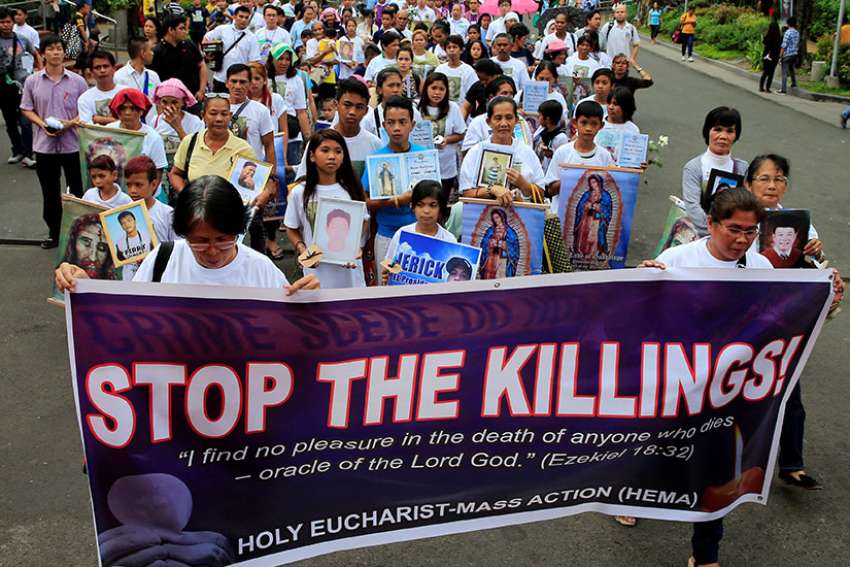Since last summer, more than 7,000 people, usually suspected drug addicts or dealers, have been killed by law enforcement officers in President Rodrigo Duterte’s brutal war on drugs. The attacks are often carried out in hit-and-run nighttime shootings by gunmen on motorcycles.
As the death toll mounts, more Catholic leaders and laypeople are taking action.
This week, The Guardian reported that many Catholic priests have been offering their churches as sanctuaries for people on government “kill lists,” or to those who believe they will be targeted. The Catholic Church connects these people to an underground network of people who provide refuge and assistance, such as finding employment.
One priest, Father Gilbert Billena, told The Guardian that at first he favoured the war on drugs, and even voted for President Duterte, “but I didn’t expect this outcome,” he said. Now he offers sanctuary to those in danger.
Still, some priests and Catholics have been afraid to speak out or offer assistance, fearing that they will become the next targets. Many Filipinos, the majority of whom are Catholic, also support the drug war, believing that it will make their neighborhoods safer.
Leaders in the Catholic Church have been increasingly outspoken against the violent drug war, calling it a “reign of terror” in a recent pastoral letter that was read at all the Sunday Masses in the country on February 5. The letter, from the Catholic Bishops’ Conference of the Philippines, denounced the killings and offered prayers and solidarity to the families of those who have been killed.
Brother Jun Santiago, with the religious order the Redemptorists, has been resisting the drug war in another way. Most nights, when the most brutal attacks of the drug war take place, he is out on the streets with journalists, capturing the scenes on his camera.
“I’m trying to get out of the brutality,” he said in a recent interview with Quartz. “I want to capture the stench, the smell of the crime scene. The night is so powerful. The darkness is so powerful. Right now people are sleeping and they don’t know what’s happening.”
In December, his photos made headlines after they were blown up and displayed outside of the National Shrine of Our Mother of Perpetual Help in Manila, also known as the Baclaran Church, where Br. Jun’s apostolate is based.
“It was a unique way of exposing reality,” Father Carlos Ronquillo, the rector of the Baclaran, told Quartz. “The power of images is something that I think can be harnessed if we as a church want to engage people to think deeply about what’s happening. Not only through words. Not only through preaching.”
Besides photography, the clergy and faithful of Baclaran Church also offer sanctuary and assistance to those whose lives are threatened by the drug wars. Through a program called the extra-judicial killing (EJK) response program, the church provides financial support, legal assistance, rehab programs and other aid to victims and families of the war on drugs. They also follow up with families of the victims photographed by Br. Jun.
“The concrete actions we are doing are really non-political,” Dennis Febre, who works for the program, told Quartz. “We respect [Duterte] as the president of the country, but at the same time the government needs to respect human rights.”
President Duterte and the Catholic leadership of the country have frequently clashed, with Duterte attacking the Church whenever they have spoken out against his leadership or his war on drugs.
In their recent pastoral letter, the Catholic bishops of the country called on the government to address the root causes of the drug problem, including poverty, family breakdown, and corruption. They said the government should address these problems through anti-poverty efforts to provide employment and living wages; family strengthening efforts; and reform in the country’s police forces, judicial systems and politics, rather than wholesale killings.
“To destroy one’s own life and the life of another, is a grave sin and does evil to society. The use of drugs is a sign that a person no longer values his own life, and endangers the lives of others. We must all work together to solve the drug problem and work for the rehabilitation of drug addicts,” they said.
(Story from the Catholic News Agency)


